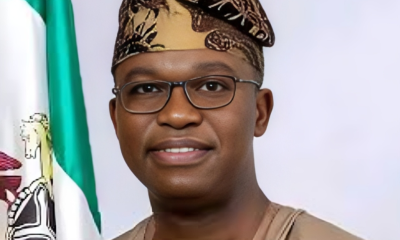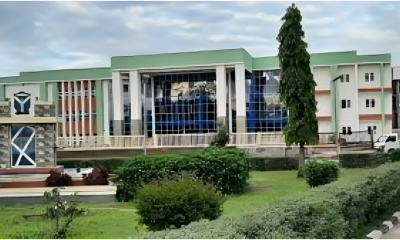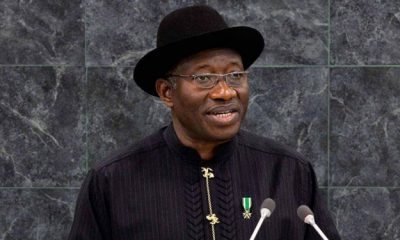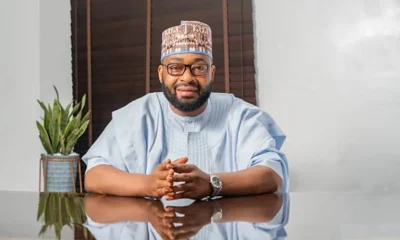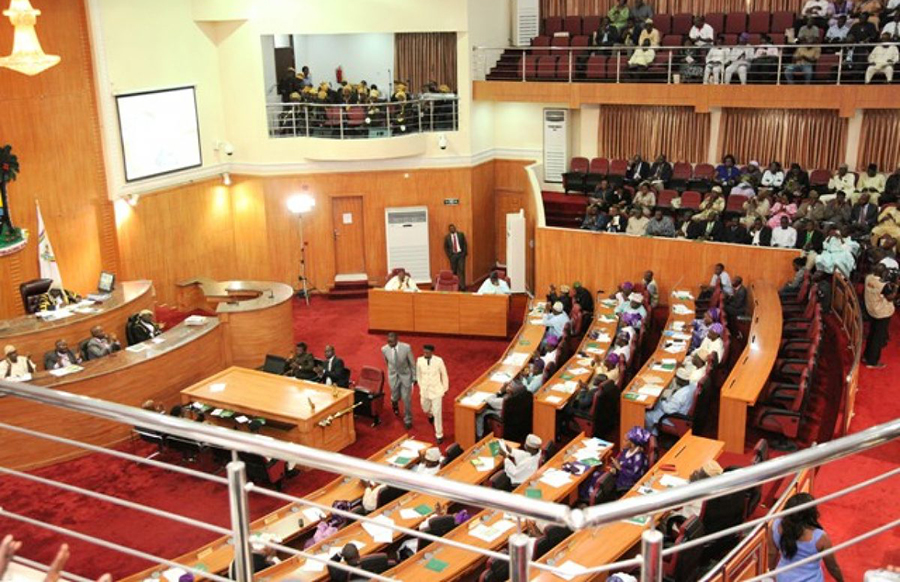NEWS
Lawmaker Blames Alia, Urges Stakeholders to Resolve Insecurity in Sankera
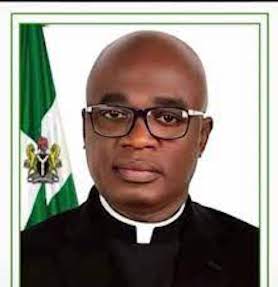
By Aondowase Kajo, Abuja
Non Cooperation amongst stakeholders of Sankera, intermediate area in Benue state has been identified as the biggest problem bedeviling the peaceful coexistence of people of axis, just as the Benue governor, Reverend Father Hycent Alia has been accused of near negligence of security issues in the three border local government areas of Katsina-Ala, Ukum and Logo.
Senator representing Benue North-East, Emmanuel Udende who lamented the absence of peace in the Sankera axis said blamed the Benue governor, Alia for doing nothing to complement the peace efforts put in place by former governor, Samuel Ortom, insisting that until Sankera sons and daughters of different extraction comes to sit on a round table and deliberate over the ugly occurrences within the axis, peace would continue to elude the area. Udende made this disclosure at a Prayer service recently at Faith Way Chapel Int’l Church in Abuja.He maintained that the disparity amongst the Sankera stakeholders has inflicted deep insecurity wounds in the Sankera area.The Law maker stressed that the lacklustre attitude of the present governor in the state has worsened the insecurity issues in the three local governments.”Like I read in 2 Chronicles chapter 7:14 that’ says ‘if my people who are called by my name shall humble themselves and seek forgiveness from their sins, I the Lord God will hear from my heavenly habitation, forgive them and heal their land.”Today, we are before God, and we believe that with God, peace will return to our land”, the States Senator said.The lawmaker emphasised that the biggest problem confronting the peaceful coexistence of Sankera people was non Cooperation of the stakeholders. “Let me tell you, during the (former governor Samuel) Ortom administration, we didn’t have it as bad as it is now, if you ask any villager, they will tell you that during his (Ortom) time, it wasn’t as bad as it is now, it was better than the present scenario”, he added.The lawmaker called on the Benue governor to double his efforts to instill a lasting solution that would bring peace in the area. “We are not criticising the governor, but he has to sit up. He has done his bid but he needs to put in more effort. There is a need for all the stakeholders to come together. We have been using the kinetic means of chasing these militia; I think non kinetic means too have to be deployed. And there is no way you can dialogue with these people except the government gives us the coverage because once you talk to them, they will say you are talking to criminals, and they will hold you liable, so we need a government that will say you can talk and negotiate with them, and the stakeholders must be there to talk with them”, Udende reiterated.On his part, leader of Ukum people in Abuja, Ugboho Aondongu Igbana said he was dismayed that the entire people of Sankera has gone astray, “And it’s on the realization that the ugly incidences pervaded the land, making God to withdraw His presence from Sankera”.In his prayers, the Presiding Pastor, FaithWay Gospel Ministries, Reverend Samuel Alaha reiterated that God specializes in supernatural interventions and that as for things too difficult for humans, it’s only God in His divinity that will supernaturally intervene to bring lasting solutions.”I want to let you know that every nation all over the world at one time or the other experienced some difficulties, every nation had experienced some depression. So there are these kinds of things but also there is that operation of God called supernatural interventions”, Reverend Alaha stated.”We have left the path which we were created to follow and God’s mercy is far from us. And the only way we can do that is to come together, recognise and acknowledge our sins, open our hearts for God to really shine the light in, and we confess our sins to God and pray so that He will return peace to us”.NEWS
Calls for Lowering Voting Age, Rejection of e-voting Dominate NILDS-Democracy School Debate

Calls for lowering voter age and rejecting e-voting on Wednesday in Abuja dominated the maiden edition of the National Institute for Legislative and Democratic Studies (NILDS)-Democracy Secondary School debate.Students from Africa Community School, Asokoro and Intelligence Quotient Academy, who emerged winners, made the call at the debate, organised to mark Nigeria’s 26th anniversary of unbroken democracy.
Report says that the topic of the debate was “Is E-Voting the Future of Nigeria’s Democracy/Should the Voting Age Be Lowered to 16 years. ”Miss Khadijah Matawale, a student of Intelligence Quotient Academy, said that every citizen had the right to life, freedom of speech and movement, and should be given the right to vote.Matawale described voting as a process of electing leaders in a democratic setting by citizens, arguing that teenagers at the age of 16 are equally citizens.According to her, if the aged have the right mindset to vote and have a say in what is going in government, teenagers at age 16 should also be allowed to vote.“If everybody, irrespective of age or experience, is affected by bad governance, why can’t voting age be reduced to accommodate those of 16 years of age?“In countries like Australia, Cuba and Brazil, they allow teenagers, 16 and 17 years of age to vote; why can’t that be implemented in Nigeria?” she queried.On her part, Miss Oluwadamilola Wright of Africa Community School, argued that though technology looked like the way forward, there were lots of constraints.Wright said that transparency could not be assured, as operators of the system were those appointed by people in power, thus making it difficult to be sure if the output was the will of the people or government officials.She also stated that electronic systems could be very expensive to acquire and operate.In his own contribution, Master Ogbodo Kelvin, of Government Secondary School, Area 10, Garki, argued that e-voting was the future of Nigeria’s electoral system and across the world.Kelvin noted that the world was changing in terms of technological advancement and that e-voting would ensure empowerment, transparency and reduction in electoral fraud.“We’re in a world where climate change is affecting us a lot. We will consume a lot of parts with manual voting but with e-voting, it will reduce the use of paper; we are conscious of our plight; it is democracy with a conscience,” he said.However, Miss Oluwapamilerinayo Abobarin, an SS II student of Treasure Homes International Schools, argued that voting should be done by adult citizens alone.Abobarin said that it was risky to allow younger teenagers to vote in deciding t fate of a complex nation like Nigeria.“A 16-year old is not emotionally stable. Science shows that the part of the brain responsible for decision-making is not yet developed until mid-twenties.“This is enough reason for us to see that a 16-year-old is not mature enough for such decision for the whole nation.“They are still very dependent on their parents; they are easily influenced and manipulated by social media influencers, easy prey for cyber bullies and can be forced by someone in their neighbourhood to vote for a particular candidate.“Imagine a 16-year-old becoming president of Nigeria, because the right to vote comes with the right to be voted for,” she said.In an interview , the General-Manager of NILDS-Democracy Radio, Mrs Uju Nwachukwu, said that the initiative was centered around questions of interest to young people.Nwachukwu said that following social media comments of young people after the 2023 elections, the debate was designed to propel new thinking among young people.“What we are trying to do is more of awareness on governance and politics for younger people.“At NILDS-Democracy Radio, our mandate is to bridge information gap between the governed and the government, and we are not leaving the younger generation.“We want to get the younger generation talking; they are the younger demography that is most often over-looked; they will turn 18 in two years.“At some point in time, they are going to be part of the system; so getting them involved now is a better strategy than waiting until that time where they express their discontent by other means like riots and protests.“Getting them intellectually involved now, getting them to do research and understand things for themselves is the essence of this conversation,” she said.Nwachukwu said that young people were very impressionable, as they could easily convince their peers to run with such ideas.The general manager said that the debate would not be a one-off event but would be expanded to include university students. (NAN)NEWS
Police Order Detention of 3 Inspectors over Alleged Extortion in Anambra

The Police Command in Anambra has ordered the detention and orderly room trial of three police Inspectors over the alleged extortion of an unsuspecting member of the public.The command’s Public Relations Officer (PRO), SP Tochukwu Ikenga, disclosed this in a statement on Thursday in Awka.
Ikenga disclosed that the State Commissioner of Police( CP) Ikioye Orutugu, had condemned the conduct of some officers who, during a patrol in Awka, unlawfully accosted an unsuspecting member of the public, searched his phone, and extorted money from him. According to the statement, the CP Anambra Command, Ikioye Orutugu on June 11 ordered the detention of three police Inspectors over an allegation of corruption.“The CP further directed the immediate commencement of internal disciplinary proceedings of the force against the officers.“The CP during interrogation of the officers frowned at the poor character exhibited when they accosted an unsuspecting member of the public during a security patrol, forcibly searched his phone and extorted money from the victim.” Ikenga quoted the CP as reaffirming that the Nigeria Police Force remained a disciplined, transparent, responsible, responsive, and accountable institution that would never condone any form of abuse of office or unprofessional conduct.“The CP noted that such anomalies, aside from negating the professional calling of the police, are unacceptable as they affect the entire execution of policies and directives.“Your character will widen the trust gap between the citizens and the force,” the CP said.(NAN)NEWS
Jonathan, Other African Leaders Call for Massive investment in Agric-tech
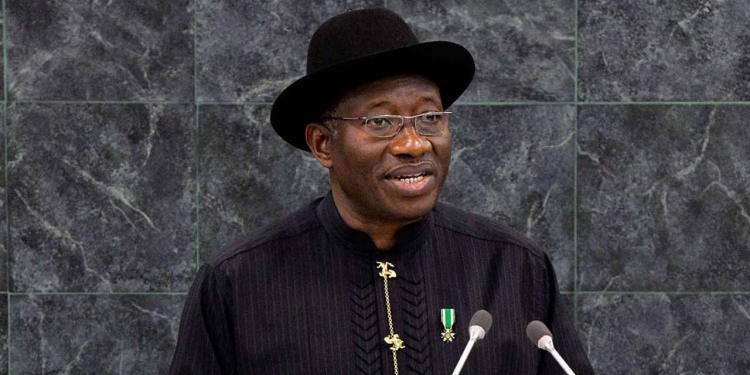
From Jude Dangwam, Jos
Former President of the Federal Republic of Nigeria, Dr. Goodluck Jonathan has called for stronger partnership and investment into smart agric-technology to turn around some of the current challenges facing its agricultural sector in the continent.
He said the Transformation of Africa’s agricultural sector can only happen if countries and institutions in the continent collaborate across borders and sectors. Noting that no single country, institution, or actor can transform African agriculture alone.Jonathan stated this in his keynote address during the second edition of the African Conference on Agricultural Technologies (ACAT), a four-days summit with focus on “Investing in the Future of African Agriculture”, held in Kigali, Rwanda from 9-12 June, 2025.He noted that the future of agriculture on the continent is intricately tied to its ability to embrace and scale available and emerging technology.The former President who is also an AATF ambassador stressed that, “Africa can turn around some of the current challenges facing its agricultural sector. However, he maintained that no single country, institution, or actor can transform African agriculture alone.He pointed out that the future of agriculture on our continent is intricately tied to our ability to embrace and scale available and emerging technology. These technologies range from precision farming and satellite imaging to drone technology and artificial intelligence, digital tools and can revolutionize the sector.While calling for action by leaders across the continent, he charged thus; “Honorable Prime Minister, Ladies and Gentlemen, the time to act is now. Let us invest not just in seeds and fertilizers, but in science, policy, and people. Let us build systems that are resilient, inclusive, and just. Let us ensure that Africa will not only feed herself but will be a net exporter of food to other parts of the world.The dream of a food-secure Africa is not only possible, it is within our reach. But it demands vision, unity, and unrelenting commitment. As leaders, stakeholders, and citizens of this great continent, let us rise together to feed not just our nations, but the future.” The former President positedThe Minister of Agriculture and Animal Resources, Republic of Rwanda, Hon. Dr. Mark Cyubahiro Bagabe, emphasized that putting farmers’ needs and preferences first is a paradigm shift for the African continent towards food security and sovereignty as we as economic emancipation of the African farmers.He disclosed that Rwanda’s agricultural transformation agenda has been informed by a farmer-centric approach, which ensures that useful innovations are accessible to farmers.The Executive Director of the African Agricultural Technology Foundation (AATF), Dr. Canisius Kanangire, noted that when farmer-centered technologies are implemented within a supportive and enabling environment, they significantly increase productivity, improve livelihoods, and drive economic empowerment.“For over two decades, AATF has coordinated the formation and implementation of public-private partnerships aimed at facilitating development and access to agricultural technologies that address production challenges, enhance yields, and contribute to the continent’s economic growth while enhancing community health and wealth.The Conference has brought together over 800 delegates drawn from the African continent and beyond. They include government representatives, industry thought leaders, policymakers, technical experts, private institutions, farmers, women, and youth. The convening is expected to build momentum towards action on current discussions and recommendations on the importance of the utilization of innovative agricultural technologies.
